Words of Wisdom - Shastra
& Shastrakaras speak
For Books and shastra downloads see Main Index, under
Books:
Om Namo Bhagavate Vasudevaya
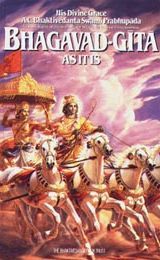

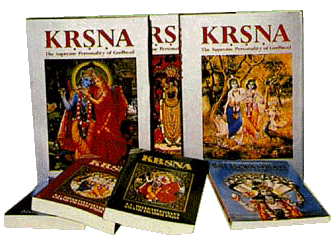
The Complete Works of Srila Prabhupada
All the books, the letters and conversations at your
fingertips
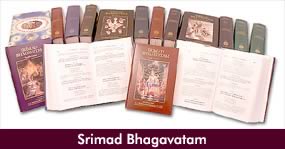
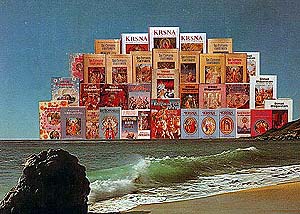
All Srila Prabhupada's books and more on one disk
http://www.vedabase.com




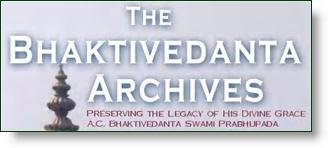
Srila Prabhupada's Audio lectures to listen to on-line:
http://www.hare-krishna.org/srila-prabhupada-lectures.htm
Listen to Srila A.C. Bhaktivedanta Swami Prabhupada on-line
- all 900 of his lectures are available HERE:
http://www.prabhupadavani.org/
Srimad Bhagavatam - the entire lecture series listen and
read along on-line - Narrated by Amala Bhakta dasa:
http://www.prabhupadavani.org/SB_index.html
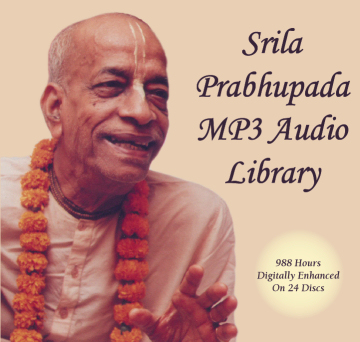
The new enhanced Prabhupada MP3 series
http://www.prabhupada.com/store/store.php?page=product.php&id=MP3AUDIOLIB

Srila Prabhupada Vyasa-puja book 2007
http://www.krishna.com/node/1048
Vyasa-puja is an annual celebration by the devotees of Lord Krishna
to offer homage to their guru, or spiritual teacher.
There are two versions of the Vyasa Puja Book based on the speed of
your internet connection.
If you are unable to open the file, download Acrobat Reader.
High speed connections, with pictures.
Vyasa-puja
Book 2007 [PDF/ZIP, 2.11MB]
Low speed connections, no pictures.
Vyasa-puja
Book 2007 (no pictures) [PDF/ZIP, 2.11MB]








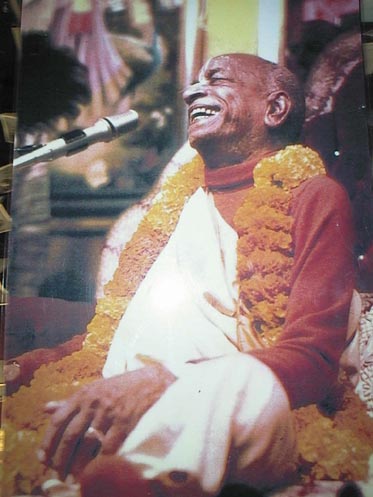
Visit "Prabhupada Connect" for all manner of Prabhupad
Nectar:
http://www.prabhupadaconnect.com/Index.html
Srila Prabhupada's Final Lesson Video - Downloadable and
viewing on-line
http://users.iskconludhiana.com/images/thumbnails.php?album=21


All Srila Prabhupada's original books
available for sale here.

Download all the Hare Krsna teachings which includes
all Vaisnava and
Vedic concepts by visiting one of the sites listed at
the following address.
http://www.geocities.com/suci123/bookdownloadsites1.html
The Bhaktivedanta Book Trust
Srila Prabhupad Memorial Library
http://www.krishna.com/main.php?id=33


33 Books Online Including Srimad Bhagavatam!
http://www.geocities.com/freeprabhupadabooks
The compressed "self extracting" file mentioned is now currently
available for download
http://www.krsnaconsciousness.org/Gauranga/Folio/BhaktivedantaVedabase_DOS.exe

Download or Listen to Prabhupad Bhajans HERE:
http://www.prabhupadavani.org/web/text/Bhajans.html


On-line 1972 McMillan edition - Bhagavad Gita As It Is:
http://www.asitis.com/

Bhagavad Gita AS IT IS on-line through the Tirupathi
Balaji site:
http://www.bhagavad-gita.us/

Bhagavad Gita Study guide on-line book:
http://chantandbehappy.com/gita/studyguide/StudyGuide-main.htm
Bhagavad Gita Study guides by numerous Iskcon devotees
- FREE downloads:
http://www.veda.harekrsna.cz/library/#3

All the Scriptures you'd ever need 4 FREE
http://www.hknet.org.nz/index-books.htm
http://www.hknet.org.nz/DDB.htm
http://www.hknet.org.nz/DDB2.html
last updated 4th August 2003


Srimad Bhagavad Gita AS
IT IS
Bhagavad Gita: Chapter
6 - Dhyana-yoga
TEXT 40
sri-bhagavan uvaca
partha naiveha namutra
vinasas tasya vidyate
na hi kalyana-krt kascid
durgatim tata gacchati
WORD FOR WORD
sri-bhagavan uvaca--the Supreme Personality of Godhead
said; partha--O son of Prtha; na eva--never is it so; iha--in this material
world; na--never; amutra--in the next life; vinasah--destruction; tasya--his;
vidyate--exists; na--never; hi--certainly; kaiyana-krt--one who is engaged
in auspicious activities; kascit--anyone; durgatim--to degradation; tata--My
friend; gacchati--goes.
TRANSLATION
The Supreme Personality of Godhead said: Son of Prtha,
a transcendentalist engaged in auspicious activities does not meet with
destruction either in this world or in the spiritual world; one who does
good, My friend, is never overcome by evil.
PURPORT by HDG Srila A.C. Bhaktivedanta Swami Prabhupada:
In the Srimad-Bhagavatam (1.5.17) Sri Narada Muni instructs
Vyasadeva as follows:
tyaktva sva-dharmam caranambujam harer
bhajann apakvo 'tha patet tato yadi
yatra kva vabhadram abhud amusya kim
ko vartha apto 'bhajatam sva-dharmatah
"If someone gives up all material prospects and takes complete
shelter of the Supreme Personality of Godhead, there is no loss or degradation
in any way. On the other hand a nondevotee may fully engage in his occupational
duties and yet not gain anything." For material prospects there are many
activities, both scriptural and customary. A transcendentalist is supposed
to give up all material activities for the sake of spiritual advancement
in life, Krsna consciousness. One may argue that by Krsna consciousness
one may attain the highest perfection if it is completed, but if one does
not attain such a perfectional stage, then he loses both materially and
spiritually. It is enjoined in the scriptures that one has to suffer the
reaction for not executing prescribed duties; therefore one who fails to
discharge transcendental activities properly becomes subjected to these
reactions. The Bhagavatam assures the unsuccessful transcendentalist that
there need be no worries. Even though he may be subjected to the reaction
for not perfectly executing prescribed duties, he is still not a loser,
because auspicious Krsna consciousness is never forgotten, and one so engaged
will continue to be so even if he is lowborn in the next life. On the other
hand, one who simply follows strictly the prescribed duties need not necessarily
attain auspicious results if he is lacking in Krsna consciousness.
The purport may be understood as follows. Humanity may
be divided into two sections, namely, the regulated and the nonregulated.
Those who are engaged simply in bestial sense gratifications without knowledge
of their next life or spiritual salvation belong to the nonregulated section.
And those who follow the principles of prescribed duties in the scriptures
are classified amongst the regulated section. The nonregulated section,
both civilized and noncivilized, educated and noneducated, strong and weak,
are full of animal propensities. Their activities are never auspicious,
because while enjoying the animal propensities of eating, sleeping, defending
and mating, they perpetually remain in material existence, which is always
miserable. On the other hand, those who are regulated by scriptural injunctions,
and who thus rise gradually to Krsna consciousness, certainly progress
in life.
Those who are following the path of auspiciousness can
be divided into three sections, namely (1) the followers of scriptural
rules and regulations who are enjoying material prosperity, (2) those who
are trying to find ultimate liberation from material existence, and (3)
those who are devotees in Krsna consciousness. Those who are following
the rules and regulations of the scriptures for material happiness may
be further divided into two classes: those who are fruitive workers and
those who desire no fruit for sense gratification. Those who are after
fruitive results for sense gratification may be elevated to a higher standard
of life--even to the higher planets--but still, because they are not free
from material existence, they are not following the truly auspicious path.
The only auspicious activities are those which lead one to liberation.
Any activity which is not aimed at ultimate self-realization or liberation
from the material bodily concept of life is not at all auspicious. Activity
in Krsna consciousness is the only auspicious activity, and anyone who
voluntarily accepts all bodily discomforts for the sake of making progress
on the path of Krsna consciousness can be called a perfect transcendentalist
under severe austerity. And because the eightfold yoga system is directed
toward the ultimate realization of Krsna consciousness, such practice is
also auspicious, and no one who is trying his best in this matter need
fear degradation.
His Divine Grace A.C. Bhaktivedanta Swami Prabhupada
Copyright 1983 The Bhaktivedanta Book Trust International. Used with
permission.

Bhagavad Gita As It Is - http://www.asitis.com/
Bhaktivedanta Vedabase - Bhagavad Gita on-line http://bhagavadgitaasitis.com/
Bhaktivedanta VedaBase: Bhagavad-gita As It Is http://vedabase.net/bg/en
Bhagavad Gita Multi Media Web-version http://chantandbehappy.com/gita/
Listen to Bhagavad Gita on line - http://www.Gitamrta.org
View our Bhagavad Gita Overview:
http://www.hknet.org.nz/BG.html
Archive: http://www.cs.rice.edu/~vivek/btg/archive/
Home Page: http://www.cs.rice.edu/~vivek/btg/
Join Bhagavad Gita eGroups HERE
mailto:bhagavad_gita-owner@egroups.com


Prabhupada Uvacha:
(here's some nectar, sometimes it comes in the form of Srutakirti prabhu's
diary, other times from Govinda dasi's diary, Hari Sauri prabhu's Transcendental
Diary, Bhurijan prabhu's book, or sometimes from a letter, or other related
source, but still nectar...)
God does not speak with rascals
His purpose for the evening was clear. He wanted
to hear the personal realizations of his disciples. His questions, prompts
and instigations of debate were both to train us and reveal what we have
actually understood. He is writing so many books which he requests us repeatedly
to read. He does not want blind, sentimental followers. He wants competent
preachers who can go out and save the world. Defeating the Mayavadis is
high on the list of priorities. Thus a question from one of the men found
Srila Prabhupada as much irritated with the man as he was with the faulty
philosophy he inquired about.
The man asked, "Srila Prabhupada, there is one
common philosophy, also held by a lot of religious groups, that God can
be understood directly from within, and that no guru or spiritual master
is necessary. If I desire to approach God, and if He's all-powerful, He
can instruct me from within. They feel like this. Therefore they dispute
our claim that we understand God in a different way, that you need a genuine
spiritual master. And yet when we approach them, one man will say he has
God within his heart and he understands God in this way, and another man
is receiving instruction from God from within the heart, and yet he's saying
another thing."
Prabhupada stated clearly the position of such
a proponent, but he was as concerned about the questioner. "He's a rascal,
and who accepts him, he's a rascal. How do you think that God is speaking
to him? How do you accept it?"
The devotee said he didn't accept it but Prabhupada
wasn't satisfied with that assurance. He had detected a problem in the
mere fact that the man had brought it up.
"But you are advocating. Why do you accept this?"
he wanted to know. "He would say, but you must know that he's talking foolish.
How God can talk with him? What is the condition? Therefore you have to
read books.
"God talks with whom? That is said. Tesam satata-yuktanam
bhajatam priti-purvakam. Those who have already become devotee of God and
engaged in His service, He talks with him. Not a third-class fool. He doesn't
talk with him. It is clearly stated, one who is twenty-four-hours engaged
in the service of the Lord, with love and faith, God talks with him. How
do you understand that God is talking with him? A rascal fool, who has
no business with God?
"So first of all see whether he's twenty-four-hours
engaged in God's service with love and faith. Then you can understand,
'Yes, God is talking with him.' But [when] he has no preliminary qualification,
if he says, 'I can talk with God,' he's a nonsense. You accept him, 'Yes,
he may be talking with God.' How he can talk? That means you are also nonsense.
You do not know with whom God talks. Why do you accept such proposition?
If some storekeeper says 'I have passed M.A., L.L.D.,' and I have to accept
that? You must know with whom God talks. That means you are nonsense. You
are accepting nonsensically. And the person who is constantly engaged in
God's service, unless he's trained up by a spiritual master, how can he
be engaged? So without spiritual master, one cannot be engaged in devotional
service, and without devotional service, nobody's eligible to talk with
God. So that nonsense talking, that without spiritual master, God talking,
and he has become perfect, this is all nonsense. One who believes, he is
also nonsense. He does not know God.
"To raise such question means nonsense. You do
not know with whom God talks, therefore you have brought this question.
Otherwise, you would have kicked immediately, 'It is impossible.' What
do you think?"
The boy again tried to reassure Srila Prabhupada.
"I understand what you are saying."
"Then why do you raise this question?"
"It's a matter of argument also," the boy replied.
Prabhupada was irked. "Argument? Why do you bring
such nonsense argument, waste time? Don't waste time. You are ignorant,
you are accepting. Don't remain ignorant. It is common sense. Is it so
easy that one can talk with God? If some common man says, 'Just now I went
to Mr. Ford, the President, and talked with him. I'm coming back from him.'
So any gentleman will believe that? So these are our insufficiency that
we believe such things. We are not properly trained up. Simply waste time.
That's not good. He may talk nonsense. Why I shall accept nonsense? Shall
I have to believe? He's a common man. How he can talk with President Ford?
If I believe, then I am also nonsense."
The devotee's next question really brought out
Srila Prabhupada's annoyance. "Does this mean that we should not speak
with those who ask such questions?"
"But you must know how to answer it!" Prabhupada
riled. "Otherwise, chant Hare Krsna. Why there are so many books? You do
not read it, you do not know how to answer it even. That means you do not
read. If you knew that God does not speak with rascals or anyone ordinary,
then you would have immediately replied, 'God does not speak to you. It
is not possible. It requires qualification.' Why should you believe it
and waste your time?"
- From the "A Transcendental Diary Vol 3" by HG
Hari Sauri dasa
To receive little snippets of nectar like this on a daily basis subscribe
HERE: or If you want to introduce anyone else in reading Srila Prabhupada
Nectars, please send their eMail addresses to mailto:krpamaya_gauranga@hotmail.com
Please Chant:
 Hare
Krishna Hare Krishna Krishna Krishna Hare Hare
Hare
Krishna Hare Krishna Krishna Krishna Hare Hare
 Hare
Rama Hare Rama Rama Rama Hare Hare
Hare
Rama Hare Rama Rama Rama Hare Hare
...................and be Happy

Listen to Srila Prabhupad on-line
....a different lecture, morning walk, conversation or
class daily.
"Bodily Field And The Tiler"
72/12/29 Bombay, Bhagavad-gita 13.1-2
Listen to the entire lecture on-line:
http://prabhupadaradio.com/M3U/Gita/m3u/GT281.m3u
Pradyumna:
arjuna uvaca
prakrtim purusam caiva
ksetram ksetra-jnam eva ca
etad veditum icchami
jnanam jneyam ca kesava
sri-bhagavan uvaca
idam sariram kaunteya
ksetram ity abhidhiyate
etad yo vetti tam prahuh
ksetra-jnah iti tad-vidah
[Bg. 13.2]
Translation: "Arjuna said: O my dear Krsna, I wish to
know about prakrti, nature, purusa, or the enjoyer, and the field and the
knower of the field, and of knowledge and the end of knowledge. The Blessed
Lord then said: This body, O son of Kunti, is called the field, and one
who knows this body, who knows this body is called the knower of the field."
Prabhupada: Ksetra-ksetra-jnam. Just like we are living
in this apartment and we know that I am not this apartment, but I am living
in this apartment. The people say that because the Supersoul or the soul
is living within this body therefore the body is soul. This is not very
good argument. That is being cleared by Krsna Himself. Idam sariram kaunteya
ksetram ity abhidhiyate [Bg. 13.2]. Ksetra. Ksetra means land or a place.
So idam sariram kaunteya ksetram ity abhidhiyate [Bg. 13.2]. And, the next
line?
Pradyumna: Etad yo vetti tam...
Prabhupada: Etad yo vetti, and one who knows it, he's
ksetra-jnah. Jnah means in knowledge. So we should know this, that I am
not this body. It is my body. If we analyze the body, I say it is my hand,
it is my leg, it is my head. Nobody says: "I head," or "I hand." "I" is
different from this body. I am living in this apartment, but I am not this
apartment. But the modern civilization is going on on the basic idea that
"I am this body." "I am American." "I am Indian." "I am brahmana." "I am
ksatriya." "I am man." "I am woman." This is condemned. This is condemned.
This is... This is the consideration of the animals. The
animals, they do not know that the dog, the body-dog, and the soul who
has obtained the body of a dog... The soul is different from the body.
This is the Vedic information: asango 'yam purusah. (static) The living
entity, soul, is not this material body. Asanga. He has no, I mean to say,
association. He's put into that condition, but he's different from the
body. (Child crying in background; aside:) What is that? She has gone out
and cannot come.
So this should be clearly understood. This is knowledge,
that I'm not this body. What is the next, second line?
Pradyumna: Ksetram ity abhidhiyate.
Prabhupada: Yes. Next?
Pradyumna: Etad yo vetti tam prahuh...
Prabhupada: Etad yo vetti. So if you study, if you meditate
on our body, so "I am this body. I am this finger." No. The answer will
come: "No, I am not this body. I am... It is my body. It is my finger.
It is my head." This is simple thing. And here it is confirmed by the Supreme
Authority, Krsna. And we can experiment it, that how it is that I am identifying
myself with this body? Therefore sastra says: yasyatma-buddhih kunape tri-dhatuke
[SB 10.84.13]. This body is a, a product of the three dhatus. According
to Ayurvedic system, kapha-pitta-vayu. So anyone who is accepting this
body made of three elements, kapha-pitta-vayu, he is no better than go-kharah.
Sa eva go-kharah [SB 10.84.13]. An animal.
yasyatma-buddhih kunape tri-dhatuke
sva-dhih kalatradisu bhauma ijya-dhih
yat-tirtha-buddhih salile na karhicij
janesv abhijnesu sa eva go-kharah
[SB 10.84.13]
Go-kharah. Go means cow, and kharah means ass. So people
are identifying with this body, but sastra says such persons are no better
than the cows and the asses. Now just try to understand what is this civilization.
Just try to understand. It is this... It is a combination of cows and asses.
Because everyone is identifying: "I am this body." "I am American." "I
am Russian." "I am China." "Let us fight." "I am Hindu." "I am Muslim."
This is going on.
The simple knowledge is lacking. The simple knowledge,
that "I am not this body. I am..." Aham brahmasmi. The Vedic language.
So 'ham. So 'ham means I am the same spirit soul as the Supersoul, as Krsna.
I am qualitatively one. As Krsna is sac-cid-ananda-vigraha, similarly I
am also sac-cid-ananda, part and parcel. The difference is that I am very
minute. As we have several times explained, the minute particle of gold
is also gold. That is not different. Minute, a drop of the sea water is
also the same, qualitatively. The same chemicals. Similarly, we, being
part and parcel of Krsna, we are not subjected to the material conditions.
But we have put ourself in this material condition. That is called maya.
We wanted to enjoy separately, de, separated from Krsna, and therefore
we are put into a condition which is illusion.
That I have already explained several times. At night,
we forget all this body. Although in daytime I identify myself that "I
am American," "I am Indian," "I am brahmana," at night, when I sleep, I
forget whether I am American, Indian, or brahmana, and ksatriya. This is
our daily experience. I am in different atmosphere. I am dreaming something.
But again at daytime I forget what I dreamt at night. So sometimes we go
very unknown place, very nice place, nice building, nice atmosphere. And
at, as soon as the dream is over, then again I am on my bed. You see. And
when I dream, I forget. I'm not in my bed, but I'm in the surrounding of
palaces, of gardens. So this is our daily experience.
So because we wanted to imitate Krsna, krsna-bahirmukha
hana bhoga vancha kare, the Krsna has given us a place which is illusion.
Which is not fact. Temporary. Illusion. Just like we sometimes see water
in the desert. That is illusion. Practically there is no illusion, uh,
there is no water. But we see: "Oh, here is water, vast water." The animals,
they run after the water. Similarly we are also running after this illusion.
"There is happiness. There is happiness." Therefore there is no happiness.
At the fag end of life, we are disappointed, we are frustrated.
Brdhya kala aula saba sukha pagala.(?) When we cannot again, no more, we
can enjoy with our senses, then we become very much depressed. Old men.
You'll find old men, those who are not spiritually inclined, they're very
morose. Morose because they cannot use anymore the senses. They sometimes
take medicine. But how it can be done? So drdhya kala aula.(?) So we are
under this illusion. This is called maya. We should understand that we
are not this body. We are not this body. Our bodily enjoyment, sense gratification,
that is illusion. In another place in the Bhagavad-gita you'll find, it
is said: sukham atyantikam yat tat atindriyam grahyam. Find out that verse.
Sukham atyantikam yat tad atindriyam grahyam. We are trying to enjoy life
with these material senses, but that is illusion, that is temporary. Temporary
and illusion. Real enjoyment is with our spiritual senses. What is it...?
Have you got?
Pradyumna:
sukham atyantikam yat tad
buddhi-grahyam atindriyam
vetti yatra na caivayam
sthitas calati tattvatah
Prabhupada: What is the translation?
Pradyumna: There's a few verses together... "The stage
of perfection is called trance or samadhi when one mind, when one's mind
is completely restrained from material mental activities by practice of
yoga. This is characterized by one's ability to see the self by the pure
mind and to relish and rejoice in the self. In that joyous state, one is
situated in boundless transcendental happiness and enjoys himself through
transcendental senses. Established thus, one never departs from the truth,
and upon gaining this, he thinks there is no greater gain."
Prabhupada: So every information is there. If we want
actually happiness, then we have to purify the material consciousness.
That is Krsna consciousness movement. [break] ...have come to the point
of Krsna consciousness. That Krsna consciousness can be achieved by the
grace of Krsna. Krsna consciousness... Athapi te deva padambhuja-dvaya-prasada-lesanugrhita
eva hi. Krsna cannot be understood by any other method than the Krsna method.
Krsna is absolute. Therefore if one wants to understand Krsna, he must
take the Krsna method. Krsna method. Because Krsna is absolute, there is
no difference between Krsna and the method of attaining Krsna. They are
the same. Method... The bhakti method means Krsna method. Bhakta-bhagavan.
And the method to approach Bhagavan is called bhakti.
The whole thing is based on one root, bhaj. Bhaj-dhatu.
Bhaj-dhatu. That means offering loving service to the Lord. And Krsna says:
bhaktya mam abhijanati [Bg. 18.55]. Bhajate mam ananya-bhak. These words
are there: sadhur eva sa mantavyah [Bg. 9.30], api cet su-duracaro bhajate
mam ananya-bhak. Bhajate, this very... Bhajate. Catur-vidha bhajante mam.
This word, bhaja is very important thing. From bhaja, the word bhakti comes.
Bhaja dhatu ukti. [?] So bhakti means bhajana. Bhajate mam ananya-bhak.
Mahatmanas tu mam partha daivim prakrtim asritah, bhajanty ananya-manasah
[Bg. 9.13]. Again: bhajanti.
Mahatmanas tu mam partha daivim prakrtim asritah
[Bg. 9.13]. This bhajana is for mahatmanah, not for the duratmas. Or ksudratma.
Mahatma. One whose atma has been expanded, ma hatma. Not crippled. Those
who are thinking in terms of society, nationality, country, religion, or
so many things, they are not mahatmas. They are ksudratmas, small, crippled
minded. Those, those who are thinking in broader way. Just like Caitanya
Mahaprabhu. He says: prthivite ache yata nagaradi grama. He's not thinking
in terms of... Prthivite ache yata nagaradi grama. As many towns and villages
are there all over the world. He's not thinking in terms of "My village,
my country, my society." Everyone is thinking like that. But those who
are mahatma actually, they are thinking in a broader way. Prthivite ache
yata nagaradi grama.
continued..........
Listen to the entire lecture on-line:
http://prabhupadaradio.com/M3U/Gita/m3u/GT281.m3u
or receive in mailbox and Subscribe HERE:
mailto:lectures-subscribe@prabhupadavani.org
Sravanam kirtanam at:
http://www.PrabhupadaVani.org
© 2001 The Bhaktivedanta Book Trust International. Used with permission.

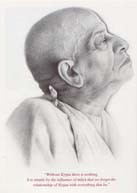
SRILA PRABHUPADA'S QUOTE OF THE DAY
You haven't got to manufacture anything. What Krsna has already said,
you repeat. Finish. Don't make addition, adulteration. Then you become
guru [...] I may be fool, rascal [...] So we have to follow this path,
that you become guru, deliver your neighbourhood men, associates, but speak
the authoritative words of Krsna. Then it will act [...] Anyone can do.
A child can do."
SP Evening darsan, Hrsikesh 1977
Sign-up to receive these quote HERE:
mailto:haribol@pacific.net.sg

Bhaktivedanta Vedabase Network ...
http://vedabase.net/


The Scientific - Mathematical
Proof for God's existence:
http://geocities.com/sector114

http://robot-hosting.com/php/login_nicholas.html
user name = guest
password = guest
(Collection of philosophical and mathematical proofs
for existence of God can be found in this site.)

Scientifically Philosophical Books for the layman
 ...
... ...
...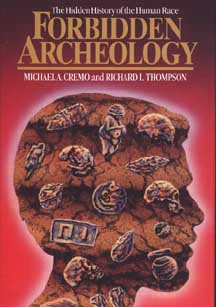 ...
...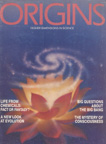
Click on any of these books to read more about them and where to get
a copy
or contact your local temple for purchases
sample of Life
comes from Life HERE.pdf

Lotus Imprints - Preserving Prabhupada's Legacy - The
Publishing House of Hari Sauri dasa
http://www.lotusimprints.com/

Quotes from Shastra - scriptures
View using Balaram font
 SaphalA
EkAdasii
SaphalA
EkAdasii
Yudhisthira Maharaj said, “O my Dear Lord Sri Krishna, what
is the name of that Ekadasi that occurs during the dark fortnight of the
month of Pausha (December-January)? How is it observed, and which Deity
is to be worshipped on that sacred day? Please narrate these details to
me fully, so that I may understand Oh Janardana.”
The Supreme Personality of Godhead Sri Krishna then replied,
“O best of kings, because you desire to hear, I shall fully describe to
you the glories of the Pausha-krshna Ekadasi.
“I do not become as pleased by sacrifice or charity
as I do by My devotees observance of a full fast on Ekadasi. To the best
of one’s ability, therefore, one should fast on Ekadasi, the day of Lord
Hari.
“O Yudhisthira, I urge you to hear with undivided
intelligence the glories of Pausha-krshna Ekadasi, which falls on a Dwadasi.
As I explained previously, one should not differentiate among the many
Ekadasis. O king, to benefit humanity at large I shall now describe to
you the process of observing Pausha-krshna Ekadasi.
“Pausha-krshna Ekadasi is also known as Saphalaa
Ekadasi. On this sacred day one should worship Lord Narayana, for He is
its ruling Deity. One should do so by follow the previously described method
of fasting. Just as among snakes Shesha-naga is the best, and among birds
Garuda is the best, among sacrifices the Ashvamedha-yajna is the best,
among rivers Mother Ganges is the best, among gods Lord Vishnu is best,
and among two-legged beings the brahmins are the best, so among all fasting
days Ekadasi is by far the best. O foremost of kings who took your birth
in the Bharata dynasty, whoever strictly observes Ekadasi becomes very
dear to Me and indeed worshippable by Me in every way. Now please listen
as I describe the process for observing Saphalaa Ekadasi.
“On Saphalaa Ekadasi My devotee should worship Me by offering
Me fresh fruits according to time, place and circumstance, and by meditating
on Me as the all-auspicious Supreme Personality. He should offer Me jaambira
fruit, pomegranate, betal nuts and leaves, coconut, guava, varieties of
nuts, cloves, mangoes, and different kinds of aromatic spices. He should
also offer Me incense and bright ghee lamps, for such an offering of lamps
on Saphalaa Ekadasi is especially glorious. The devotee should try to stay
awake all the Ekadasi night.
“Now please hear with undivided attention as I tell you
how much merit one gets if he fasts and remains awake throughout the entire
night singing and chanting the glories of Narayana. O best of kings, there
is no sacrifice or pilgrimage that yields merit that is equal to or better
than the merit one gains by fasting on this Saphalaa Ekadasi. Such fasting
– particularly if one can remain awake and alert the entire night long
– bestows the same merit upon the faithful devotee as the performance of
austerity for five thousand earthly years. O lion among kings, please hear
from Me the glorious history that made this Divine Ekadasi famous.
“Once there was a City called Champaavati, which was
ruled by the saintly King Maahishmata. He had four sons, the eldest of
whom, Lumpaka, always engaged in all manner of very sinful activities –
illicit sexual encounters with the wives of others, gambling, and continual
association with known prostitutes. His evil deeds gradually reduced the
wealth of his father, King Maahishmata. Lumpaka also became very critical
of the numerous devas, the empowered universal attendants of the Lord,
as well as toward the brahmins, and every day he would go out of his way
to blaspheme the Vaishnavas. At last King Maahishmata, seeing the unrepentant
brazen fallen condition of his son, exiled him to the forest. Out of fear
of the king, even compassionate relatives didn’t come to Lumpaka’s defense,
so angry was the king toward his son, and so sinful was this Lumpaka.
“Bewildered in his exile, the fallen and rejected Lumpaka
thought to himself, ‘My father has sent me away, and even my kinsmen do
not raise but a finger in objection. What am I to do now?’ He schemed sinfully
and thought, ‘I shall sneak back to the city under cover of darkness and
plunder its wealth. During the day I shall stay in the forest, and as night
returns, so shall I to the city.’ So thinking, the sinful Lumpaka
entered the darkness of the forest. He killed many animals by day, and
by night he stole all manner of valuable items from the city. The city-dwelling
folk apprehended him several times, but out of fear of the king they left
him alone. They thought to themselves that it must have been the accumulated
sins of Lumpaka’s previous births that had forced him to act in such a
way that he lost his royal facilities and became to act so sinfully like
a common selfish thief.
“Though a meat-eater, Lumpaka would also eat fruits every
day. He resided under an old banyan tree that unknown to him happened to
be very dear to Lord Vaasudeva. Indeed, many worshipped as the demi-god
(representative departmental head) of all the trees in the forest. In due
course of time, while Lumpaka was doing so many sinful and condemnable
activities, the Saphalaa Ekadasi arrived. On the eve of the Ekadasi (Dasami)
Lumpaka had to pass the entire night without sleep because of severe cold
that he felt due to his scanty bedclothes (bedding). The cold not only
robbed him of all peace but almost of his very life. By the time the sun
rose, near dead, his teeth chattering and near comatose. In fact all that
Ekadasi morning, he remained in that stupour and could not awaken out of
his near comatose condition.
“When midday of the Saphalaa Ekadasi arrived, the sinful
Lumpaka finally came to and managed to rise up from his place under that
banyan tree. But with every step he took, he stumbled and fell to the ground.
Like a lame man, he walked slowly and hesitantly, suffering greatly from
hunger and thirst in the midst of the jungle. So weak was Lumpaka that
he couldn’t even concentrate to nor muster strength to go and kill even
a single animal that whole day. Instead, he was reduced to collecting whatever
fruits had fallen to the ground of their own accord. By the time he returned
to his banyan tree home, the sun had set.
“Placing the fruits on the ground next to him (at the
base of the sacred banyan tree), Lumpaka began to cry out, ‘O, woe is me
! What should I do ? Dear father, what is to become of me? O Sri Hari,
please be merciful to me and accept these fruits as an offering !’
Again he was forced to lie awake the whole night without sleep, but in
the meantime the all merciful Supreme Personality of Godhead, Lord Madhusudana,
had become pleased with Lumpaka’s humble offering of forest fruits, and
He accepted them. Lumpaka had unwittingly observed a full Ekadasi fast,
and by the merit he reaped on that day he regained his kingdom with no
further obstacles.
“Listen, O Yudhisthira, to what happened to the son of
King Maahishmata when but a fragment of the merit spouted up within his
heart.
“As the Sun beautifully rose in the sky on the day following
Ekadasi, a handsome horse approached Lumpaka as if seeking him out, and
stood next to him. At the same time, a voice suddenly boomed out from the
clear blue sky saying, ‘This horse is for you, Lumpaka! Mount it and ride
swiftly out of this forest to greet your family! O son of King Maahishmata,
by the mercy of the Supreme lord Vaasudeva and the strength of the merit
you acquired by observing Saphalaa Ekadasi, your kingdom will be returned
to you without any further hindrances. Such is the benefit you have gained
by fasting on this most auspicious of days. Go now, to your father and
enjoy your rightful place in the dynasty.’
“Upon hearing these celestial words resounding from above,
Lumpaka mounted the horse and rode back to the city of Champaavati. By
the merit he had accrued by fasting on Saphalaa Ekadasi, he had become
a handsome prince once more and was able to absorb his mind in the lotus
feet of the Supreme Personality of Godhead, Hari. In other words, he had
become My pure devotee.
“Lumpaka offered his father, King Maahishmata, his humble
obeisances and once more accepted his princely responsibilities. Seeing
his son so decorated with Vaishnava ornaments and tilak (udhvara pundra)
King Maahishmata gave him the kingdom, and Lumpaka ruled unopposed for
many, many years. Whenever the Ekadasi came, he worshipped the Supreme
Lord Narayana with great devotion. And by the mercy of Sri Krishna he obtained
a beautiful wife and a fine son. In old age Lumpaka handed his kingdom
over to his son – just as his own father, King Maahishmata, had handed
it over to him. Lumpaka then went to the forest to dedicate his concentrate
attention to gratefully serve the Supreme Lord with controlled mind and
senses. Purified of all material desires, he left his old material body
and returned back to home, back to Godhead, attaining a place near the
lotus feet of his worshipful Lord, Sri Krishna.
“O Yudhisthira, one who approaches Me as Lumpaka
did will become completely free of lamentation and anxiety. Indeed, anyone
who properly observes this glorious Saphalaa Ekadasi – even unknowingly,
like Lumpaka – will become famous in this world. He will become perfectly
liberated at death and return to the spiritual abode of Vaikuntha. Of this
there is no doubt. Moreover, one who simply hears the glories of Saphalaa
Ekadasi obtains the same merit derived by one who performs a Rajasurya-yajna,
and at the very least he goes to heaven in his next birth, so where is
the loss?”
Thus ends the narration of the glories of Pausha-krshna Ekadasi,
or Saphalaa Ekadasi, from the Bhavishya-uttara Purana.
These stories have been summarised and slightly changed, abbreviated
or added to from how they are found in the celebrated book, "Ekadasi: The
Day of Lord Hari" 1986. HH Krishna Balaram Swami. Bhaktivedanta Institute
Press.
This particular Ekadasi is found on pages 29-32.

Makara Sankranti

last updated 10th January 2006
The Sun enters the Makara raasi (the zodiac sign of Capricorn
- the goat), on Sankranti day, signifying the onset of Uttarayana Punyakalam.
The following has been translated from an article in Sadachara
Vybhavam of the great Vaishnava devotee Sripad Madhwacharya.
Today is "Makara Sankranti" -- which is celebrated when
the Sun begins the northward journey, marking the beginning of the "uttaraayaNa
puNyakaalam". Sun enters the sign of "Makara", (Capricorn) from Cancer
at this time. (This is also called equinox, when the day and nights are
exactly the same). Starting this day, the duration of day starts to increase
until "dakshiNaayanam" comes. Makara Sankranti signifies two things. One
is the changing path of Sun and other is the beginning of "Uttarayana Punyakaala"
Makara literally means "Capricorn" and sankranti means "change" or 'sankramaNa'
literally means 'crossing'. On this day, it is said that Sun passes from
one Zodiac sign to another. A sankranti or sankramaNa marks the beginning
of every solar month in the Vedic calendrical system when Sun passes from
one sign to the other, it's the cusp of the months as astro-wallas call.
But, being solar based the change of January 14th or 15th of every year
is considered more sacred than any other month, as it is the beginning
of Uttarayana Punyakaala.
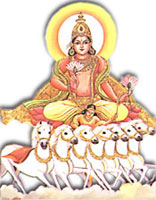
Lord Surya on His dazzling chariot that has thousands of
spokes and magnificent wheels, and driven by seven horses (seven colours
of the spectrum) begins His journey northward into the Makara Rasi, filling
our lives with light and getting rid of the darkness. This light
not only fills our material life and helps our plants grow at seeding time,
but also gets rid of our "internal" darkness, showing the path of self
realisation - moksha.
On this day, devotees prepare a dish made of green grams,
rice and jaggery (sarkkarai pongal) - representing Lord Narayana, Laxmi
and Their Divine love. The festival reminds us that we need to establish
that Divine Love within ourselves and give a direction to this "chanchala
buddhi" and fix it our Lord Narayana, who brings light in our lives.
This same festival is celebrated as Pongal in the
South of India. Harvest is brought home the new rice is then boiled
in milk to make the sweet called "chakrapongali", the special cuisine of
the eve. This harvest festival is celebrated for 3 days. The delicacy is
first offered to Sun God, the chief deity under worship, that is later
distributed to all as prasadam. The harvest is celebrated as being blessed
with Dhanyalakshmi and a splendid feast is shared by all after the Ishta
Devatha pujas.
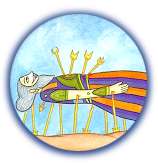
Traditionally, this period is considered an auspicious
time and the veteran
Bhishma of Mahabharata
chose to die during this period. Bhishma fell to the arrows of Arjuna.
With his boon to choose the time of his death, he waited on a bed of arrows
to depart from this world only during this period. Sri Bhishma Pitamaha
waited on the bed of arrows till the "uttaraayaNa punyakaalam" has arrived,
and then breathed once more, for the last time. It is believed that one
escapes the cycle of repeated birth and death, if one gives up one's body
on this day. The uttarAyaNa (norther course of the Sun) was traditionally
considered more auspicious than the dakshiNAyana (southern course of the
Sun). Over the years, this led some to believe that dying during dakshiNAyana,
the southern path of the sun, was inauspicious and did not lead to moksha
- release - liberation.
This belief
is cast aside in the Brahma-Sutras that the time of death is immaterial
in the case of the intelligent devotee. In those Sutras 4.2.19-20, it is
established that one who has knowledge of the Lord can die during any time;
the exaltations of uttarAyaNa are merely to praise meditation on the path
to Vaikuntha, which the wise devotees jIva takes upon death. This
divine path beginning with light, is presided upon by deities of greater
and greater brilliance, with uttarAyaNa being one of them. This marga -
path culminates in Vaikuntha, the state of moksha, and shastra says it
should be meditated upon daily by the yogi of devotion.
Sesame oil is used in making sweets and dishes, particularly
on this day. It is believed that sesame seeds are used for purificatory
purposed (or as being auspicious - "tila juhomi sarasaagum sapishhThaam
gandhaara mama chitteramanutu swaaha", "tila krishnaa tila shevataa tila
saumyaa vashaanugaa"...).
 So generally special
offerings of til (sesame) rice and corn (first harvest) are offered and
distributed, especially preparations of rice kitcheri with sesame and corn
are a prefered offering to the Lord on this day. In different parts of
India slight variations (gauna - local traditions prevail) but the gereral
observance is much the same. In the South of India they absorb themselves
in the festival of Pongal - new harvest festival.
So generally special
offerings of til (sesame) rice and corn (first harvest) are offered and
distributed, especially preparations of rice kitcheri with sesame and corn
are a prefered offering to the Lord on this day. In different parts of
India slight variations (gauna - local traditions prevail) but the gereral
observance is much the same. In the South of India they absorb themselves
in the festival of Pongal - new harvest festival.
Some devotees also have elaborate festivals offering six
kinds of sesame preparation in the service of the Lord on Sat-tila
ekadasi:
See the following links just below for some interesting
insights:
Other information about Makara sankranti - lincluding
local traditions - festivals:
The wide range of festivities can better be witnessed
by one along the countryside than in the urban localities. The festivities
last the whole of Dhanurmasam, ending with Sankranti.
Gobbemmalu – Young girls are seen to put up Gobbemmalu.
These are round balls of cow dung that are decorated with vermilion, turmeric
and coloured flowers. These are placed in the middle of the bright muggus
in the front yards of the dwellings and are worshipped with Navadhanyas
(nine types of grains) to welcome the Lakshmi, the Goddess of abundance
and prosperity. Spinsters worship for good husbands on the occasion. After
this, the women folk get gathered to sing and dance to the accompaniment
around these gobbis.
Many a traditional folk form add glory to the festive
scenario. Haridasulu (Madhwas) are seen singing eulogies of the Almighty
and seeking arms from the people in the early hours of the days. Gangireddu
Ata, is another festival where trained oxen dance to the tunes of the Nagaswaram
played by their master is a great attraction - probably not too many in
Auckland. Kommudasarulu & PittalaDora are other folklore that brighten
the days with their healthy humour - we can handle that......I got some
one liners.....
Kites – kites are seen soaring high in the sky on the
day of Makara Sankranti. This is symbolic of the existence of mankind,
with the kites depicting the human lives and the manza depicting the eternal
bond between us and the divine self. People however seem to correlate the
soaring kites with their high spirits on the eve of Makara sankranti. Competitions
held with kites of all sizes and shapes and the sharp edged manza draw
people on the terraces and in open grounds to witness the riot of colours
- fun for the gurukulis.
In some places they have the focus on the newly married
couples who are presented with special gifts and clothes.
Makara Sankranti - info:
http://www.indiainformation.com/festival/sankaranti.htm
Makara Sankranti and Ganga Sagar mela:
http://in.geocities.com/biswas_anirban/Makar.html
Sankranti
http://www.andhratoday.com/festival/sank.htm
Ganga Sagar mela - West Bengal tourist board:
http://www.travel-westbengal.com/fes_ganga.htm
Ganga Sagar Mela - A dip for Moksha:
http://www.indiaprofile.com/pilgrimage/gangasagarmela.htm
One month preceding Sankranti is called Dhanurmasam and
is also an auspicious period. People wake up early, complete their morning
ablutions and go around the streets singing devotional songs. Houses are
whitewashed and farmers clean their warehouses. Colourful Rangooli / muggulu
are drawn in the front yards of every house during this month. These artistic
floral designs are drawn on the floor with rice flour or fine powder of
limestone. These patterns are decorated with colors and adorned with marigold
placed on cowdung balls. Colourfully dressed young girls go round them
singing songs (gobbi patalu).

Ganga Sagara festival (Makara
Sankranti Mela)
Ganga Puja
The Bi-annual Paraya Festival
in Udupi
South Indian Pongal (Harvest
Festival) on Makara Sankrati:
Kumbha Mela - Magh Mela
The followers
of Madhwacharya's view of Makara Sankranti

All pictures from Srimad Bhagavatam and Iskcon works - Copyright ©2005
The Bhaktivedanta Book Trust
International, on the web at .http://www.krishna.com/.
Used with permission.

Courtesy of http://www.vedabase.com/
used
with permission









![]()
![]()
![]()
![]()

![]()
![]()
![]()
![]()

![]()
![]()
![]()
![]()















 SaphalA
EkAdasii
SaphalA
EkAdasii



